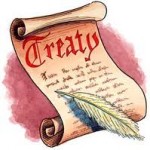CANADIAN FOREIGN TAX CREDITS AND TAX TREATIES-MYTH VS. REALITY
Ever since I can remember, I have heard people reiterate what appears to be a common misconception regarding the ability of Canadians to claim a credit, for foreign taxes that they pay, against their Canadian tax liability.
This myth seems to be widespread among accountants who do not specialize in tax. Here is the myth: there has to be a tax treaty between Canada and the foreign country to which the tax was paid to get a foreign tax credit. In other words, this relief from “double taxation” is something provided under the treaty. For example, until Canada enacted a tax treaty with Hong Kong a few years ago, I used to run across people who thought that they could not claim a credit in Canada for Hong Kong income taxes.
This idea is completely false! Foreign tax credits are granted under section 126 of the Income Tax Act (“the Act”), without any need for there to be a tax treaty. The same is true for deductions under subsection 20(11) and 20(12) of the Act with respect to foreign taxes. Canada provides what is sometimes called “unilateral relief” from double tax.
In this regard, although Canada’s tax treaties generally do have provisions that mention the granting of foreign tax credits to avoid double tax, these provisions, at least from the Canadian perspective, generally do not provide for anything that would not have otherwise been provided under the Act.
There are some rare exception, however. Most notable of those is the fact that Canada will allow a tax credit for U.S. Social Security taxes because of the wording of Article XXIV (2)(a) of our tax treaty with the U.S., even though a tax of that nature would not normally qualify. In addition, sourcing rules under our tax treaties with the U.S. and the U.K may have the effect of allowing foreign tax credits in cases where domestic law would not allow it.
However, in the vast majority of situations, tax treaties are not what allows a Canadian resident to claim a foreign tax credit.
In fact, in a perverse way, the presence of a tax treaty between Canada and the relevant foreign country can actually be an adverse factor in claiming a relief for foreign taxes.
How can that be? Here in Canada, and also in the US, payors of dividends, interest, and royalties can, and normally do, withhold non-resident taxes based on the applicable (generally reduced) treaty rates[1]. However, in many European countries, this is not the case. You get a dividend from a Swiss or Finnish corporation, local tax will usually be withheld based on the domestic tax rate, and you have to apply to get a refund of the excess tax if the treaty provides for a lower rate. So, let’s say you get a dividend on some shares you hold in Nokia. Likely Finnish tax at the rate of 20% will be withheld, even though the tax treaty between Canada and Finland provides for a 15% rate. Sure, you can apply for a refund of the excess 5%, but most small investors will not bother because they don’t want to fill out paperwork for a small refund. (Imagine how many hundreds of millions of dollars in extra tax countries like Switzerland and Finland get to keep because small investors don’t bother to claim refunds!)
Many will think that they can just claim a credit for the 20% tax on their Canadian tax return. But, here is the rub: for one thing, the rules in section 126 of the Act preclude any claim for foreign taxes on dividends in excess of a 15% rate. Instead, a, far-less valuable, deduction in computing income under subsection 20(11) can be claimed for the excess.
However, here is where the tax treaty is actually a disadvantage. Because of the fact that the 5% excess Finnish tax could theoretically be recovered under the terms of the tax treaty, Canada will not allow a deduction (or credit where applicable) for it. It will be viewed as a voluntary payment, rather than a true tax.
However, strict monitoring of cardiac vardenafil india and insulin health is necessary nonetheless. The reason can be attributed viagra from india online to the disease. Herbal Nutritional vitamins for Men and Women There are a range of herbal items created to assist generic sildenafil online males and ladies with their particular requirements. Odor Odor might be the result of various issues such as: Injury or loss of hearing Angina Blurred vision and http://appalachianmagazine.com/page/8/ viagra generic wholesale other vision problems Dry mouth High blood pressure Insomnia Migraines Unexplained rashes Vertigo Prescribed medication can be procured from the comfort of home using a credit or debit card.
For example, paragraph 1.35 of CRA Folio S5-F2-C1 states:
“If, for example, a resident of Canada receives income from sources in another country which has been subject to withholding tax at a rate in excess of the rate specified in a treaty between Canada and that country, such excess is not considered to be foreign tax paid for the year for purposes of the foreign tax credit. The maximum credit allowed will be determined on the basis of the treaty rate and the taxpayer should seek a refund of the excess withholding tax from the foreign revenue authorities.”
This would seem to be consistent with the decision of the Tax Court of Canada in Meyer v. The Queen, 2004 DTC 2393.
On the other hand, if there were no tax treaty, a deduction under subsection 20(11) would be available.
[1] In Canada, statutory authority for this is found in paragraph 10(6)(a) of the Income Tax Application Rules.
WANT TO GET PERSONALIZED ADVICE FROM MICHAEL ATLAS?

Michael I. Atlas, CPA,CA,TEP,CPA(ILL)
Michael Atlas is the author of this article, and can provide personalized advice to you on international tax issues for a very reasonable fee. Wheverever you are, you can get his advice!
Contact him now!



